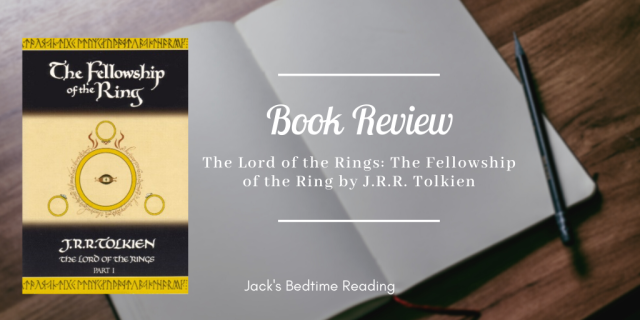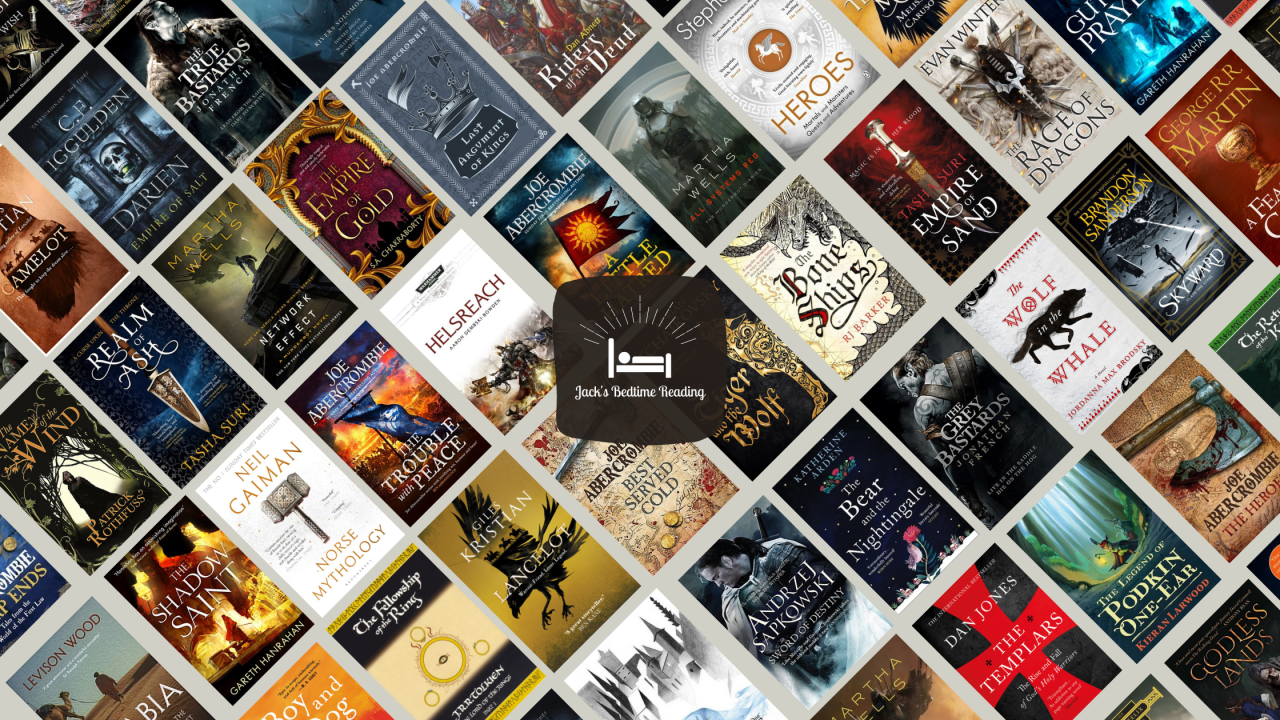
The Lord of the Rings: The Fellowship of the Ring is quite simply an absolute classic and giant of the fantasy genre. Full disclosure, this isn’t my first time reading The Lord of the Rings, in fact this might be my fourth or fifth time, but it is my first time reading it since starting my blog. I guess this means that this a bit of a different review from my usual ones as these aren’t my initial thoughts, but ones I have developed over many years.
For those that don’t know the story, here is a quick blurb:
Sauron, the Dark Lord, has gathered to him all the Rings of Power – the means by which he intends to rule Middle-earth. All he lacks in his plans for dominion is the One Ring – the ring that rules them all – which has fallen into the hands of the hobbit, Bilbo Baggins.
In a sleepy village in the Shire, young Frodo Baggins finds himself faced with an immense task, as his elderly cousin Bilbo entrusts the Ring to his care. Frodo must leave his home and make a perilous journey across Middle-earth to the Cracks of Doom, there to destroy the Ring and foil the Dark Lord in his evil purpose.
Now what do I think about this book? This book that has influenced so much of modern fantasy? I like it. I really like it. In fact, it really is a true favourite of mine. Partly because of the impact it has had on the genre of fantasy, as well as the brilliant and epic story of the battle between good and evil that it tells. But, I will admit that this feeling comes with bias and nostalgia. Why do I say this? Because this book isn’t necessarily going to be for all modern fantasy fans. Parts of the book, and the way it was written, do feel quite stiff and dated. However, once – or if – you get your head around that, I think most people will still be captivated by the story itself, the world and the characters.
Probably the most common criticism that I see for the Lord of the Rings books, and a common reason I see people say they couldn’t finish this first one, is the pace. And this is one I completely understand… But don’t necessarily agree with. Yes, the pace of the opening 2/3 of the book is slow, but after the Council of Elrond it picks up dramatically! This initial slow pace is, in my own humble opinion, done completely on purpose to make the reader feel a sense of safety, comfort and homeliness in the Shire. It gives us , as a reader, a grounding that makes the more fantastical parts of the book, and the dangers, seem greater as we see these things through the hobbits eyes. The hobbits aren’t great warriors or powerful wizards, they are quite simply very normal. They love their homes and want nothing more than to live in peace and quiet. Seeing the world through their eyes is as close to seeing the world through our own eyes because of this – we wouldn’t understand everything around us and would be in awe of the likes of Gandalf, Elrond and Aragorn, while being equally terrified of places like Moria, the Balrog and the Nazgul. And for me, this totally works as a great way to tell the story. Plus, this slow pace allows for some absolutely beautiful descriptive writing.
Saying that, there are a few parts of the story that are, in my opinion, a bit unnecessary and slow the already slow pace down. Namely the inclusion of Tom Bombadill and the poetry. I personally think that Bombadill’s purpose is to show Frodo that there are great forces at work in the world that aren’t Sauron and the will of evil. But, I just find him a bit naff and would have preferred some other resolution to the dangers presented by the Old Forest and the Barrow Downs. I wouldn’t cut those dangers out though, as some non-Sauron related dangers bring a depth and realism to the journey.
I’m also not a huge fan of the poetry and songs that are littered throughout the book, and think they are just a bit of self indulgence that Tolkien got away with. I’m not sure that he would if he was publishing now as having characters burst into song all the time is a bit weird, but I guess that writing poetry was a passion of his and it helps show us what a real labour of love these books were for him.
Enforcing this idea and image that these books (alongside everything else in Middle Earth) were a labour of love is the level of detail and world-building that he put in. This part of these books is just astounding and awe-inspiring, and I personally can’t think of a fantasy world I have ever read about that can match Tolkien’s Middle Earth in terms of detail and history. Westeros is probably the closest I can get, but still not quite the same.
Alongside the world-building, probably one of the BEST things parts of this book is the character building that goes on… and specifically the friendships! With the hobbits, this all goes pack to the pace. If Frodo’s initial journey was quicker, we wouldn’t have got to spend so much time with Frodo, Sam, Merry and Pippin, and subsequently seen how much they just love and care for each other. Honestly, those four little hobbits would go through hell for each other – and it is fantastic! And I am sure that these camaraderie in the face of danger is built from Tolkien’s own experiences of fighting in WWI. In a story about the fight between good and evil, these hobbits show us the very best of people. With the rest of the fellowship, especially Legolas, Gimili and Boromir, their personalities don’t necessarily start to shine until the final quarter or so of the book. But their still great and, I know, they will only get stronger over the course of the rest of the series.
Anyway, I’ve definitely rambled enough for one post here. I would completely recommend that you try this book. I’m not sure it will be for everyone – even fantasy fans – due to the slightly stiff writing and initial slow pace. But try them. And even if you don’t really love them, you will see sooooo much of fantasy in a new light. You’ll constantly be reading other books and be going, “I see how The Lord of the Rings influenced that!”

Yay, a fellow Lord of the Rings devoted fan! 😀
LikeLiked by 1 person
They’re great! I do understand why they’re not everyone’s cup of tea, but those people are wrong! 😀
LikeLiked by 1 person
😂😂😂
LikeLiked by 1 person
One of the best reviews of one of the best books. I am yet to tackle this one. But God, do I love Tolkien!
LikeLiked by 1 person
Thank you! Great to hear I am doing a half decent job, and you’ll have to get stuck into the Lord of the Rings books!
LikeLike
Lovely review! And it’s always a joy to read the words of a fellow Tolkien admirer 😊
Yes, the prose might feel a little stiff to our modern tastes, but having known this story and these characters for near to five decades, the old-style wording is part and parcel of the experience, and I would not change a single piece of it…
LikeLiked by 2 people
No, I certainly wouldn’t change the style of writing either! Old fashioned doesn’t mean bad; it just doesn’t sit well with everyone, but the story is too good to risk changing. Plus, I quite like Tolkien’s style once you get into the flow of it. It is just different to modern authors.
LikeLiked by 1 person
I agree with everything you say! I love the slow pace, the wonder, the lyricism and how much love Tolkien obviously poured into the work. I am old enough that I read it before there was really anything else published in this genre, (as a huge paperback, not a trilogy) and I’ve seen how much it influences every fantasy author, whether they’ve read it or not. As a more experienced reader and a writer now, I can see the flaws, and I don’t care a bit! I will always adore it and always be in awe of Tolkien for writing it.
LikeLiked by 1 person
Yes! Admitting something has faults isn’t necessarily a bad thing, but I do love the story!
LikeLiked by 1 person
Pingback: Book Review: The Lord of the Rings: The – Book Reviews | Jack's Bedtime Reading
Pingback: Book Review: The Lord of the Rings: The Return of the King by J.R.R. Tolkien – Book Reviews | Jack's Bedtime Reading